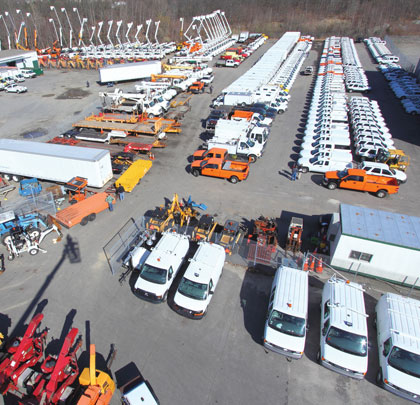Buying and selling in the used equipment market
More and more asset owners are procuring equipment online than ever before. Those who attend auctions regularly can attest to the growing number of sellers moving online. And just about every piece of machinery large fleet owners and contractors need to complete important projects can be found online.
IMF Survey, an online magazine published by the International Monetary Fund (IMF), forecasts global economic growth to average 3.6 percent in 2014—up from 3 percent in 2013—and to rise to 3.9 percent in 2015. According to the report, the U.S., the “Euro Area,” and Japan will drive much of the growth. Emerging markets will contribute more than two thirds of global growth. As the economy continues to grow, more public and private construction projects will gain approval, meaning new equipment will need to be purchased. And, old equipment often is sold to make room for the pieces required to complete new assignments.
But equipment is harder than ever to get your hands on. In response to the economic downturn, manufacturers have been producing less equipment. According to the U.S. Census Bureau report, published in January 2014, machinery shipments from January through November 2013 increased 3 percent year-over-year while new machinery orders grew 7.3 percent. With demand high, buyers must work harder to find equipment at the best prices possible and sellers constantly look for new ways to liquidate the equipment they no longer need.
SAVVY EQUIPMENT BUYERS
Auctions have long been a key part of the acquisition process. But as more buyers and sellers move online, buyers are open to new purchasing models. Manufactures are bringing their assets to market directly, providing buyers with even more options. However, as more options become available, buyers must be smart.
Online marketplaces offer new ways to buy and sell equipment. They are worth exploring because they offer access to a broad amount of inventory from a variety of sellers, but also offer buyer protection and customer support you may not find when dealing with a direct purchase.
CHOOSING AN ONLINE MARKETPLACE
There are many factors to consider when determining where to buy or sell online. When selecting an online marketplace, buyers should consider one that offers size, selection, security, and experience.
Size: Choose an online marketplace that offers a competitive environment that sets market pricing. Access to more sellers simply enhances the network effect—more sellers bring more content, which will drive more buyers, which in turn attracts more sellers, which will bring more content.
Selection: The best marketplaces offer a variety of inventory types and volume. Look for tools to help you make an educated buying decision, including good item descriptions, photos, videos, and inspection reports.
Security: Be certain that the marketplace you choose puts your security first. Only work with a partner that protects buyer data, vets its sellers, is PCI compliant, and offers dispute resolution services. Some marketplaces also offer badging, making it easier to identify top sellers.
Experience: You should have a positive experience every time you buy online. Choose an online marketplace that that is intuitive and easy-to-use. Look for a provider with strong customer support availability 7 days a week.
If you are an asset owner looking for assistance with selling, you should consider flexibility, security, size, selection, and service.
Flexibility: Don’t be content offering your assets for sale in only one format. While some providers offer only auction-based solutions, some more sophisticated marketplaces offer instant purchase or make-an-offer capabilities. Work with a provider that offers a variety of selling methods, and who will counsel you on the best method for your assets. Also, make sure you can easily move assets from one selling format to another depending on your needs.
Security: Make sure you’re protected. Only work with an online marketplace that protects you from fraudulent buyers. Ask if the marketplace offers bank-level security, if it’s PCI compliant, if they have teams dedicated to fraud prevention, and if they have dispute resolution experts on staff. Do not work with someone who’s only line of defense is credit card verification.
Size: Choose a marketplace that offers a large existing buyer base, and is committed to growing that community with every sale. The best marketplaces support their sellers through strategic advertising and marketing to drive buyers to their sales.
Selection: Surround yourself with like-minded sellers who pride themselves on working with a leading marketplace. Find the biggest brands selling in your asset class and follow suit.
Service and support: The best online marketplaces offer a complete suite of products and services to ensure you have a positive experience. Work with a marketplace that offers one point of contact for sales assistance, a customer service line, marketing guidance, and analytics following each sale.
CATCH THE MOMENTUM
The used equipment market is hot, and it will be for the unforeseeable future. Explore buying and selling online and gain a competitive advantage of those who are resistant to make the jump online.
■ ■ ■
[divider]
About the Author Jason Nielsen is the senior vice president of operations for Proxibid, an online marketplace and selling solution for excess inventory. More than $2 billion in inventory passes through Proxibid’s marketplace annually in product categories that include heavy equipment and commercial and industrial equipment. For more information, visit www.proxibid.com.
Modern Contractor Solutions, June 2014
Did you enjoy this article?
Subscribe to the FREE Digital Edition of Modern Contractor Solutions Magazine!


